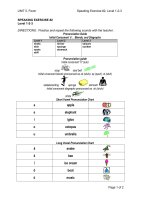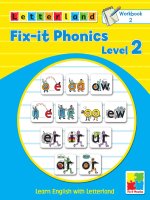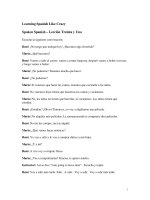Free grammar ebook level 2
Bạn đang xem bản rút gọn của tài liệu. Xem và tải ngay bản đầy đủ của tài liệu tại đây (1.84 MB, 99 trang )
Free English
Grammar
E-Book
Level 2
~ 2 ~
www.espressoenglish.net
Table of Contents
Present Continuous For Future Use…………………………………… 5
Will or Going To? ………………………………………………………………. 6
Linking Words: Reasons and Results ……………………………… 7
Linking Words: Adding, Organizing, Summarizing…………… 10
Linking Words: Contrasting Ideas……………………………………… 13
Tips for Learning Irregular Verbs ……………………………………… 14
Simple Past and Past Continuous ……………………………………… 20
Present Perfect + Ever / Never ………………………………………… 23
Present Perfect + Yet / Already / Just ……………………………… 25
Present Perfect + For / Since …………………………………………… 27
Present Perfect Simple / Continuous ………………………………… 28
Comparative Adjectives: Not as ______ as ……………………… 30
Comparative Adjectives: Quantifiers ………………………………… 31
Comparative or Superlative? ……………………………………………… 33
So / Neither / Too ……………………………………………………………… 34
Verbs + Infinitive or –ING ………………………………………………… 38
Permission, Obligation, Prohibition …………………………………… 42
Prepositions of Time …………………………………………………………… 46
Prepositions of Place …………………………………………………………… 51
Prepositions of Movement …………………………………………………… 56
Relative Clauses …………………………………………………………………… 61
Word Order: Asking Questions …………………………………………… 65
~ 3 ~
www.espressoenglish.net
Direct and Indirect Questions ………………………………… 70
Two Forms of “Used to” …………………………………………… 73
Too and Enough ………………………………………………………… 74
Some / Any / No ………………………………………………………… 75
Subject-Verb Agreement …………………………………………… 78
First Conditional ………………………………………………………… 81
Second Conditional …………………………………………………… 83
Should / Could / Would ……………………………………………… 85
Past Perfect ………………………………………………………………… 88
Present Perfect or Past Perfect? ………………………………… 91
Passive Voice: Present / Past …………………………………… 94
Reported Speech: Statements…………………………………… 95
Reported Speech: Requests, Orders, Questions ……… 97
~ 4 ~
www.espressoenglish.net
Welcome!
Thanks for downloading the Free English Grammar E-Book Level 2 – I hope
it helps you with your English studies! If you have any questions about the
lessons, please e-mail me at
Espresso English has over 300 fun, fast online English lessons
(www.espressoenglish.net). You can also sign up to get new English lessons
every week by e-mail, as well as the Free English Grammar E-Book Level 1.
Please Share This Book
This book is free, but can I ask you to help me with one thing?
Please post a link to the book on Facebook and Twitter to share it with your
friends and classmates. Thanks – I really appreciate it!
~ 5 ~
www.espressoenglish.net
Present Continuous For Future Use
Talking about the future in English
Many students use only will or going to in
order to talk about the future. However, it’s
very common to use the present
continuous to talk about the future, in the case
of arrangements that are planned:
+ I’m having dinner with friends tonight.
+ She’s meeting David at the train station tomorrow.
- He isn’t coming to the party.
- We aren’t seeing our family this weekend.
? What are you doing on Saturday?
? Is Mary arriving at 7:00 or 8:00 tomorrow morning?
You can use the present continuous for future plans with these words:
tonight, tomorrow, this weekend
next week/month/year
this summer/fall/winter/spring
on Monday/Tuesday/Wednesday/etc.
next Monday/Tuesday/Wednesday/etc.
~ 6 ~
www.espressoenglish.net
Will or Going To?
There are two additional ways to talk about the future in English:
will/won’t and going to.
Use “going to” for plans and arrangements:
On my next vacation, I’m going to stay in a nice hotel in Paris.
She’s going to look for a new job after her current contract ends.
David’s going to meet me at the airport at 8:00.
We’re going to get married next July.
They’re going to visit Amy next week. They made plans to meet up
on Monday.
Peter and Paul are going to share an apartment when they move to
New York.
Note: You can also use the present continuous for the future in these cases.
On my next vacation, I’m staying at a nice hotel in Paris.
David’s meeting me at the airport at 8:00.
We’re getting married next July.
Use “will/won’t” for promises:
I‘ll send you an e-mail.
I won’t tell anyone your secret.
He‘ll pay you back tomorrow.
We won’t forget your birthday.
Use “will” for offers:
I‘ll buy you a drink.
My secretary will help you with the paperwork.
Use “will” for decisions made in that moment:
“Would you like potatoes or rice?”
“I‘ll have the rice.”
”Which shirt do you like?”
“Well, the red one is cheaper, but I prefer the color blue. I‘ll take the
blue one.”
~ 7 ~
www.espressoenglish.net
You can use either “will/won’t” or “going to” for predictions or general
statements about the future:
My company‘s going to move its headquarters overseas next year.
My company will move its headquarters overseas next year.
Your wife will love those flowers – they’re beautiful!
Your wife’s going to love those flowers – they’re beautiful!
The economy isn’t going to improve much this year.
The economy won’t improve much this year.
He won’t pass the test. He hasn’t studied at all.
He’s not going to pass the test. He hasn’t studied at all.
Linking Words: Reasons and Results
Image source: FreeDigitalPhotos.net
Linking words help you connect the ideas in a
sentence. In this lesson, you’ll learn some
common linking words to
express reasons and results.
Linking Words: Reasons
Use I think… will and I don’t think… will to express thoughts
about the future.
Don’t use I think… won’t. (it doesn’t sound natural).
• I think you won’t like this movie. It’s very violent.
• I don’t think you’ll like this movie. It’s very violent.
Will/Won’t vs. Going to Quiz
Click here to take the quiz!
~ 8 ~
www.espressoenglish.net
Because / Because of
The difference between these two words is that because is followed by
a subject + verb, and because of is followed by a noun:
• The game was canceled because of the rain.
• The game was canceled because it was raining.
Due to / Owing to
Due to and owing to are also followed by a noun. These words are a little
more formal.
There’s a lot of traffic today due to the upcoming holiday.
(holiday = noun)
The after-school program was canceled owing to lack of interest from
the students.
(lack = noun)
Due to the fact that / Owing to the fact that
Use these phrases before a subject + verb. Again, these phrases are a little
more formal.
Many people are still unemployed due to the fact that the economic
recovery has been slower than anticipated.
The publisher rejected the author’s latest work owing to the fact that
the manuscript was full of errors.
Since / As
Since and as are more informal, and they are followed by a subject +
verb.
• I’m going to bed at 10 PM since I need to get up early tomorrow.
• I didn’t go to the gym today, as I had a lot of homework to do.
Linking Words: Results
In spoken English, many people say ’cause as a short form of “because.”
~ 9 ~
www.espressoenglish.net
Therefore / Consequently / As a result
These words are more formal, and are more commonly used in written
English.
Our company’s profits have increased 150% in the past
year. Therefore, we’re going to invest in new equipment and training
programs.
The tennis player had knee surgery mid-October; consequently, she
took the rest of the season off.
There have been heavy rains throughout the interior of the state. As a
result, several areas have experienced flooding.
So
“So” is more informal, and more commonly used in spoken English.
We were hungry, so we stopped at a cafe for a snack.
Linking Words Quiz: Reasons and Results
Click here to take the quiz!
/>results/#quiz
~ 10 ~
www.espressoenglish.net
Linking Words:
Adding, Organizing, Summarizing
Adding Information and Examples
for example / for instance
Use these words to give one example of the idea you are talking about. Both
of these expressions can go at the beginning or the end of a sentence.
There are a number of problems in this school. For example, many of
the classrooms don’t have audiovisual equipment.
She has a lot of good ideas for our business – opening an online
store, for instance.
namely / such as
There is a difference between namely and such as.
Namely is followed by ALL of the examples you referred to, but such
as gives only one or some of the examples, not all of them.
Written English: i.e. and e.g
In written English, we can use i.e. to give further explanation or
clarification; it means “that is” or “in other words.”
Our last marketing campaign failed (i.e. we spent $50,000
and didn’t make many sales).
We can use e.g. to give examples; it means “for example”
I enjoy radical sports (e.g. rock climbing, hang gliding, and
windsurfing).
In formal writing, these expressions always appear inside
parentheses.
~ 11 ~
www.espressoenglish.net
A few of the students – namely Brian, Thomas, and Jack – failed the course.
A few of the students, such as Brian, failed the course.
also / too
Also can go in the middle of a sentence, whereas too is typically used at the
end.
We did a lot of sightseeing on our vacation. We also bought a number of
souvenirs.
We did a lot of sightseeing on our vacation. We bought a number of
souvenirs, too.
as well / as well as
As well goes at the end of the sentence (similarly to too).
As well as must be followed by another word.
• She’s not only extremely successful, she’s beautiful as well.
• She’s beautiful as well as being extremely successful.
in addition / moreover / furthermore
These linking words are usually used at the beginning of a sentence to add
another idea or further develop the previous point.
People who exercise regularly have more energy during the day and
sleep better at night. In addition, they tend to live longer.
Construction on the new subway has been delayed for months due to
budget shortfalls. Moreover, the workers are threatening to go on
strike.
Our sales are expected to rise 30% in the next
year. Furthermore, purchase of new equipment will help cut
manufacturing costs and increase profits.
~ 12 ~
www.espressoenglish.net
Organizing and Ordering Information
Firstly / Secondly
When you are going to make a series of points, you can
use firstly and secondly for the first and second points. After that, you can
use “The third point,” ”The fourth point,” etc. or “in addition.”
Lastly / Finally
For your final point, you can begin the sentence with lastly or finally. These
words show your audience that you are almost finished.
the former / the latter
You can use these words to refer back to two examples previously
mentioned:
Our company has two factories: one in Detroit and one in Atlanta. The
former is operating at 95% capacity and the latter at 65%.
In this case, “the former” = the factory in Detroit, and “the latter” = the
factory in Atlanta.
Summarizing Information
Here are some English phrases you can use to give a summary of the
information you have already said or written. In general, these phrases go at
the beginning of the sentence and are followed by a comma.
• In short,
• In summary,
• To summarize,
• In conclusion,
• In a nutshell,
(more informal)
Note: In addition, moreover, and furthermore are more formal
English. In informal spoken English, we usually use the expressions
plus, what’s more, and besides.
~ 13 ~
www.espressoenglish.net
Linking Words: Contrasting Ideas
Image source: FreeDigitalPhotos.net
But / However
But is more informal than however. You can
use however at the beginning of a sentence, but you can’t
use but at the beginning of a sentence (in written English).
I tried to lift the box, but it was too heavy for me.
I tried to lift the box. However, it was too heavy for me.
Although / Even though
These linking words are the same, and they are both followed by a subject
+ verb.
Although I exercise every day, I can’t seem to lose any weight.
She still loves him, even though he treated her very badly.
Despite / In spite of
These linking words are the same, and they are followed by a noun or
a gerund (-ing form of the verb, which can function as a noun).
Our plane arrived on time in spite of the delay during takeoff.
We won the game despite having two fewer players.
Despite the fact that / in spite of the fact that
These phrases are followed by a subject + verb.
They arrived on time in spite of the fact that they left an hour late.
We won the game despite the fact that we had two fewer players.
While / Whereas / Unlike
These linking words are used to make contrasts. While and whereas are
usually used between two complete phrases. Unlike is typically used with
only a subject.
I like tennis, while my brother prefers bowling.
~ 14 ~
www.espressoenglish.net
This cell phone plan costs $0.05 per minute, whereas that one gives
you up to 800 minutes per month for a fixed price.
His boss allows him to work from home, unlike mine.
She’s very friendly, unlike her sister.
Tips for Learning Irregular Verbs
Did you know that about 70% of the time when we use a verb in English, it
is an irregular one? That means that learning and using irregular verbs is
essential for learning English!
The English language has so many irregular verbs that it can make you go
crazy… but even irregular verbs follow some patterns. In this lesson,
you’ll learn “groups” of irregular verbs that can make it easier to memorize
them.
Don’t just study this list – try to create your own sentences and use all the
verbs you know! This will help you remember them much better.
Ready? Let’s go!
Verbs with all 3 forms identical
Let’s begin with the easiest group of irregular verbs. These verbs are the
same in the present, the past, and the past participle. They include:
bet, burst, cast, cost, cut, fit,* hit, hurt, let, put, quit, set, shut, split,
spread
* When talking about clothes being the correct size
Verbs with identical Present and Past Participle
Linking Words Quiz: Contrasting Ideas
Click here to take the quiz!
/>ideas#quiz
~ 15 ~
www.espressoenglish.net
These verbs are the same in the present and the past participle. Only the
simple past form is different:
Present Past Past Participle
come came come
become became become
run ran run
Verbs with –N in the Past Participle
These verbs are a little more complicated, as they have –n in the past
participle form. There are a few different groups of verbs:
With “o” in the past and past participle
Present Past Past Participle
break broke broken
choose chose chosen
forget forgot forgotten
freeze froze frozen
get got gotten
speak spoke spoken
steal stole stolen
tear tore torn
wake woke woken
wear wore worn
~ 16 ~
www.espressoenglish.net
With “o” in the past only
Present Past Past Participle
drive drove driven
ride rode ridden
rise rose risen
write wrote written
Past with -ew, past participle with -own
Present Past Past Participle
blow blew blown
fly flew flown
grow grew grown
know knew known
throw threw thrown
Other irregular verbs with past participle ending in –n
Present Past Past Participle
bite bit bitten
hide hid hidden
eat ate eaten
fall fell fallen
forbid forbade forbidden
forgive forgave forgiven
give gave given
~ 17 ~
www.espressoenglish.net
see saw seen
shake shook shaken
take took taken
Verbs with vowel changes
Long “e” changes to short “e”
Present Past Past Participle
keep kept kept
sleep slept slept
feel felt felt
bleed bled bled
feed fed fed
meet met met
lead led led
“ea” is pronounced differently
Present Past Past Participle
deal dealt dealt
dream dreamt dreamt
mean meant meant
read read read
hear heard heard
~ 18 ~
www.espressoenglish.net
Long “i” changes to “ou”
Present Past Past Participle
bind bound bound
find found found
grind ground ground
wind wound wound
Short “i” changes to “u”
Present Past Past Participle
dig dug dug
stick stuck stuck
spin spun spun
sting stung stung
swing swung swung
-ell changes to -old
Present Past Past Participle
sell sold sold
tell told told
-ought and –aught endings
Present Past Past Participle
bring brought brought
buy bought bought
~ 19 ~
www.espressoenglish.net
catch caught caught
fight fought fought
seek sought sought
teach taught taught
think thought thought
Verbs with 3 different vowels!
Are you ready for a challenge? These irregular verbs have different vowels in
each form. Fortunately, they do follow a pattern.
Vowel changes from “i” to “a” to “u”
Present Past Past Participle
begin began begun
drink drank drunk
ring rang rung
shrink shrank shrunk
sing sang sung
sink sank sunk
spring sprang sprung
swim swam swum
The REALLY Irregular Verbs
Well, these are the completely irregular verbs – the ones that don’t fit into
any of the categories above! They are also some of the most commonly used
verbs in the English language, so make sure to memorize them in all their
crazy irregular forms!
~ 20 ~
www.espressoenglish.net
Present Past Past Participle
be was / were been
do did done
go went gone
have had had
make made made
Simple Past and Past Continuous
When to use the Past Continuous
To talk about things that were in progress in the past.
Past Continuous Positive
To form the past continuous positive, use
subject + was/were + verb + -ing
I / He / She / It
was
studying
You / We / They
were
studying
Examples:
“What were you doing when I called you?”
“I was studying.”
She was playing guitar at the party.
At 5:30 last night, we were driving home.
They saw a starfish while they were walking on the beach.
~ 21 ~
www.espressoenglish.net
Past Continuous Negative
The past continuous negative is:
subject + was not / were not + verb + -ing
I / He / She / It
was not
(wasn’t)
studying
You / We / They
were not
(weren’t)
studying
Examples:
I wasn’t listening when the teacher gave the instructions.
She wasn’t wearing jeans. She was wearing a dress.
We weren’t driving very fast because the road was wet.
They weren’t sleeping at 10 PM last night; they were watching a
movie.
Past Continuous Questions
To form past continuous questions, use:
Was/Were + subject + verb + -ing
Was I / he / she / it sleeping?
Were you / we / they sleeping?
Examples:
Were you sleeping when I called you?
What was she thinking about last night? She looked worried.
Was it raining when you left the bar?
What music were they listening to?
~ 22 ~
www.espressoenglish.net
Simple Past and Past Continuous
The past continuous is often used together with the simple past to show
that one thing happened while another thing was in progress:
I was talking on the phone when my sister arrived.
He was drinking beer when he suddenly felt sick.
She took a photo as we were getting out of the bus.
We were waiting for the bus when we saw a car accident.
Note: You can put a question word at the beginning:
• Who were you talking to on the phone last night?
I was talking to my cousin.
• What was John doing at the library?
He was looking for a book.
• Why were they drinking champagne yesterday?
Because it was their anniversary.
Be careful! Some verbs are never used in the continuous form:
like, want, need, believe.
I was needing to find a job.
I needed to find a job.
She was believing that he loved her.
She believed that he loved her.
~ 23 ~
www.espressoenglish.net
Present Perfect + Ever / Never
“Have you ever taken dance classes?”
Use the present perfect + ever to ask questions about experiences in
someone’s life.
“Have you ever taken dance classes?”
“Yes, I have. I took 6 weeks of lessons before my wedding!”
“Has your brother ever been to India?”
“No, he hasn’t.”
“Have your friends ever helped you move to a new apartment?”
“Yes – twice!”
Simple Past and Past Continuous Exercises
Click here to take the Quiz!
/>continuous#quiz
Don’t use “ever” in the answer. Only use it in questions.
If you want, you can use before in the answer:
• Yes, I’ve ever taken dance classes.
• Yes, I’ve taken dance classes before.
(or simply “Yes, I have.”)
~ 24 ~
www.espressoenglish.net
Use the present perfect + never to talk about things you have NOT done
at any time in your life.
I’ve never failed a test. I’ve always gotten 80% or more.
He’s never heard of Michael Jackson. I can’t believe he doesn’t know
the King of Pop!
Samantha has never been surfing. She’s afraid of the ocean.
We’ve never studied Italian. We studied French and Spanish in school,
but Italian wasn’t available.
They’ve never told a lie. I know we can trust them.
Conversation Tip: Many conversations begin with a question in the
present perfect, and then continue with more specific questions about
the experience in the simple past:
• “Have you ever taken dance classes?”
• “Yes, I have. I took 6 weeks of lessons before my
wedding last year.”
• “Wow! So did you dance well on the big day?”
• “No, I didn’t – I forgot everything I’d learned in the
classes, and I stepped on my wife’s feet many times!”
• “Oh no! Was she angry?”
• “No – she said she still loved me!”
Present Perfect + Ever / Never Quiz
Click here to take the quiz!
/>evernever#quiz
~ 25 ~
www.espressoenglish.net
Present Perfect + Yet / Already / Just
The words already, yet, recently, lately, and just all refer to a recent and
non-specific time. (A specific time would be “yesterday” or “three hours
ago” or last Friday,” and in these cases we would use the simple past).
Already and yet
Already can be used in positive statements and questions.
• “I’ve already read today’s newspaper.”
• “Have you already paid the electric bill?”
• “She’s finished the test already.”
Note: Already can go in between “have/has” and the past participle (as in
the first two examples) or at the end of the sentence.
Yet can be used in negative statements and questions.
• “We haven’t cleaned the house yet.”
• “Has he told you the good news yet?”
• “Have they booked their tickets yet?”
Note: Yet usually goes at the end of the sentence or phrase.
Recently, lately, and just
Recently and lately can be used in positive statements, negative statements,
or questions:
Recently
• “He’s recently lost some weight.”
• “I haven’t seen her recently.”
• “Have you spoken to Beth recently?”
Lately
• “I’ve gotten a lot of spam e-mails lately.”
• “Adam and Jessica haven’t been to church lately.”
• “Have you seen any good movies lately?”









